- Home
- Hermann Hesse
The Glass Bead Game Page 10
The Glass Bead Game Read online
Page 10
Before they left, each of the boys received a small gift: the scores of two Bach choral preludes for Joseph, a handsome pocket edition of Horace for his friend. The Master, as he was bidding good-by to Joseph, said to him: "In a few days you will learn which school you have been assigned to. I come to the higher schools less frequently than to Eschholz, but I am sure we shall see each other there too, if I keep in good health. If you care to, you might write me a letter once a year, especially about the course of your musical studies. Criticism of your teachers is not prohibited, but I am not so concerned about that. A great many things await you; I hope you will meet the challenges. Our Castalia is not supposed to be merely an elite; it ought above all to be a hierarchy, a structure in which every brick derives its meaning only from its place in the whole. There is no path leading out of this whole, and one who climbs higher and is assigned to greater and greater tasks does not acquire more freedom, only more and more responsibilities. Till we meet again, young friend. It was a pleasure to me to have you here."
The two boys tramped back, and both were gayer and more talkative than they had been on the way to Monteport. The few days in different air and amid different sights, the contact with a different sphere of life, had relaxed them, made them freer from Eschholz and the mood of parting there. It had also made them doubly eager for change and the future. At many a resting place in the forest, or above one of the precipitous gorges in the vicinity of Monteport, they took their wooden flutes from their pockets and played duets, mostly folksongs. By the time they had once again reached that peak above Eschholz, with its prospect of the institution and its trees, the conversation they had had there seemed to both of them far away in the past. All things had taken on a new aspect. They did not say a word about it; they felt a little ashamed of what they had felt and said so short a while ago, which already had become outmoded and insubstantial.
In Eschholz they had to wait only until the following day to learn their destinations. Knecht had been assigned to Waldzell.
TWO
Waldzell
"But Waldzell breeds the skillful Glass Bead Game players," runs the old saying about this famous school. Among the Castalian schools of the second and third levels, it was the one most devoted to the arts. That is to say, whereas at other schools a particular branch of scholarship was distinctly dominant, such as classical philology in Keuperheim, Aristotelian and Scholastic philosophy in Porta, mathematics in Planvaste, Waldzell traditionally cultivated a tendency toward universality and toward an alliance between scholarship and the arts. The highest symbol of these tendencies was the Glass Bead Game. Even here, as at all the other schools, the Game was by no means taught officially and as a compulsory subject. But Waldzell students devoted their private studies almost exclusively to it. Then again, the town of Waldzell was after all the seat of the official Glass Bead Game and its institutions. The famous Game Hall for the ceremonial games was located here, as was the enormous Game Archives, with its officialdom and its libraries. Here, too, was the residence of the Ludi Magister. And although these institutions existed altogether independently and the school was in no way attached to them, the spirit of the institutions permeated the school. Something of the hallowed atmosphere of the great public Games spread over the whole area. The town itself was very proud of being the home not only of a school, but of the Game also. The townspeople called the students "scholars" and referred to those who attended the Game School as "lusers"--a corruption of lusores.
The Waldzell school was, incidentally, the smallest of the Castalian schools. The number of students rarely exceeded sixty, and undoubtedly this circumstance also helped to lend it an air of uniqueness and aristocracy, of special distinction, for here was the very elite of the elite. Moreover, during the past several decades this venerable school had produced many Masters and the majority of Glass Bead Game players. Not that Waldzell's brilliant reputation was entirely uncontested. Some thought that the Waldzellers were priggish aesthetes and pampered princes, useless for anything but the Glass Bead Game. At times there would be a vogue among the schools for making sardonic comments on the Waldzell students; but the very harshness of the jokes and criticisms proves that jealousy and envy underlay them. All in all, the transfer to Waldzell in itself implied a certain distinction. Joseph Knecht, too, realized that, and although he was not ambitious in the vulgar sense of the word, he accepted the distinction with a measure of joyous pride.
Along with several schoolmates, he arrived in Waldzell on foot. Full of high expectations and ready for whatever might come, he walked through the southern gate and was instantly enchanted by the dark-brown aspect of the town and the great bulk of the former Cistercian monastery in which the school had been established. Even before he had been given his new uniform, immediately after the reception snack in the porter's lodge, he set out alone to explore his new home. He found the footpath that ran along the remains of the ancient town wall above the river, stood on the arched bridge and listened to the roaring of the millrace, walked past the graveyard and down the lane of linden trees. He saw and recognized, beyond the tall hedges, the Vicus Lusorum, the adjacent little settlement of the Glass Bead Game players. Here were the Festival Hall, the Archives, the classrooms, the houses for guests and teachers. He saw coming from one of these houses a man in the dress of the Glass Bead Game players, and decided that this must be one of the fabulous lusores, possibly the Magister Ludi in person. The spell of this atmosphere exerted a tremendous force upon him. Everything here seemed old, venerable, sanctified, rich with tradition; here one was quite a bit closer to the Center than in Eschholz. And as he returned from the Glass Bead Game district, he began to feel other spells, possibly less venerable, but no less exciting. They came from the town itself, this sample of the profane world with its business and commerce, its dogs and children, its smells of stores and handicrafts, its bearded citizens and fat wives behind the shop doors, the children playing and clamoring, the girls throwing mocking looks. Many things reminded him of remote worlds he had once known, of Berolfingen. He had thought all that entirely forgotten. Now deep layers in his soul responded to all this, to the scenes, the sounds, the smells. A world less tranquil than that of Eschholz, but richer and more colorful, seemed to be awaiting him here.
As a matter of fact, the school at first turned out to be the exact continuation of his previous school, although with the addition of several new subjects. Nothing was really new there except the meditation exercises; and after all the Music Master had already given him a foretaste of these. He accepted meditation willingly enough, but without regarding it as more than a pleasant, relaxing game. Only somewhat later--as we shall see in due time--would he have a living experience of its true value.
The headmaster of Waldzell, Otto Zbinden, was an unusual, somewhat eccentric man who inspired a certain amount of fear. He was nearing sixty at the time Knecht entered. A good many of the entries we have examined concerning Joseph Knecht are set down in his handsome and impetuous handwriting. But at the beginning the young man's curiosity was captured far less by the teachers than by his fellow students. With two of these in particular Knecht struck up a lively relationship, for which there is ample documentation. The first of these was Carlo Ferromonte, a boy his own age to whom he became attached during his very first months at Waldzell. (Ferromonte later rose to the second-highest rank on the Board, as deputy to the Music Master; we are indebted to him for, among other things, a History of Styles in Sixteenth-Century Lute Music.) The other boys called him "Rice Eater" and prized him for his aptitude at sports. His friendship with Joseph began with talks about music and led to joint studying and practicing which continued for several years; we are informed about this partly by Knecht's rare but copious letters to the Music Master. In the first of these letters Knecht calls Ferromonte a "specialist and connoisseur in music rich in ornamentation, embellishments, trills, etc." The boys played Couperin, Purcell, and other masters of the period around 1700. In one of the letters Kne
cht gives a detailed account of these practice sessions and this music "in which many of the pieces have some embellishment over almost every note." He continues: "After one has played nothing but turns, shakes, and mordents for a few hours, one's fingers feel as if they are charged with electricity."
In fact he made great progress in music. By his second or third year at Waldzell he was reading and playing the notations, clefs, abbreviations, and figured basses of all centuries and styles with tolerable fluency. He had made himself at home in the realm of Western music, as much of it as has been preserved for us, in that special way that proceeds from practical craftsmanship and is not above taking utmost heed of a piece of music's sensuous and technical aspects as a means for penetrating the spirit. His intense concern with the sensuous quality of music, his efforts to understand the spirit of various musical styles from the physical nature of the sounds, the sensations in the ear, deterred him for a remarkably long time from devoting himself to the elementary course in the Glass Bead Game. In one of his lectures in subsequent years he remarked: "One who knows music only from the extracts which the Glass Bead Game distills from it may well be a good Glass Bead Game player, but he is far from being a musician, and presumably he is no historian either. Music does not consist only in those purely intellectual oscillations and figurations which we have abstracted from it. All through the ages its pleasure has primarily consisted in its sensuous character, in the outpouring of breath, in the beating of time, in the colorations, frictions, and stimuli which arise from the blending of voices in the concord of instruments. Certainly the spirit is the main thing, and certainly the invention of new instruments and the alteration of old ones, the introduction of new keys and new rules or new taboos regarding construction and harmony are always mere gestures and superficialities, even as the costumes and fashions of nations are superficialities. But one must have apprehended and tasted these superficial and sensuous distinctions with the senses to be able to interpret from them the nature of eras and styles. We make music with our hands and fingers, with our mouths and lungs, not with our brains alone, and someone who can read notes but has no command of any instrument should not join in the dialogue on music. Thus, too, the history of music is hardly to be understood solely in terms of an abstract history of styles. For example, the periods of decadence in music would remain totally incomprehensible if we failed to recognize in each one of them the preponderance of the sensuous and quantitative elements over the 'spiritual element.'"
For a time it appeared as if Knecht had decided to become nothing but a musician. In favor of music he neglected all the optional subjects, including the introductory course in the Glass Bead Game, to such an extent that toward the end of the first semester the headmaster called him to an accounting. Knecht refused to be intimidated; he stubbornly insisted on his rights. It is said that he told the headmaster: "If I fail in any official subject, you could rightly reprimand me. On the other hand I have the right to devote three quarters or even four quarters of my free time to music. I stand on the statutes of the school." Headmaster Zbinden was sensible enough not to insist, but he naturally remembered this student and is said to have treated him with cold severity for a long time.
This peculiar period in Knecht's student days lasted for more than a year, probably for about a year and a half. He received normal but not brilliant marks and--to judge by the incident with the headmaster--his behavior was marked by a rather defiant withdrawal, no noteworthy friendships, but in compensation this extraordinary passion for music-making. He abstained from almost all private studies, including the Glass Bead Game. Several of these traits are undoubtedly signs of puberty; during this period he probably encountered the other sex only by chance, and mistrustfully; presumably he was quite shy--like so many Eschholz pupils if they do not happen to have sisters at home. He read a great deal, especially the German philosophers: Leibniz, Kant, and the Romantics, among whom Hegel exerted by far the strongest attraction upon him.
We must now give some account of that other fellow student who played a significant part in Knecht's life at Waldzell: the hospitant Plinio Designori. Hospitants were boys who went through the elite schools as guests, that is, without the intention of remaining permanently in the Pedagogic Province and entering the Order. Such hospitants turned up every so often, although they were quite rare, for the Board of Educators was naturally averse to the idea of educating students who intended to return home and into the world after they finished their studies at the elite schools. However, the country had several old patrician families who had performed notable services for Castalia at the time of its foundation and in which the custom still prevailed (it has not entirely died out to this day) of having one of the sons educated as a guest in the elite schools. It had become an established prerogative for those few families, although of course the boys in question had to be gifted enough to meet the standards of the schools.
These hospitants, although in every respect subject to the same rules as all elite students, formed an exceptional group within the student body if only because they did not grow increasingly estranged from their native soil and their families with each passing year. On the contrary, they spent all the holidays at home and always remained guests and strangers among their fellow students, since they preserved the habits and ways of thinking of their place of origin. Home, a worldly career, a profession and marriage awaited them. Only on very rare occasions did it happen that such a guest student, captivated by the spirit of the Province, would obtain the consent of his family and after all remain in Castalia and enter the Order. On the other hand, in the history of our country there have been several statesmen who were guest students in their youth, and now and then, when public opinion for one reason or another had turned against the elite schools and the Order, these statesmen came stoutly to the defense of both.
Plinio Designori, then, was one such hospitant whom Joseph Knecht--slightly his junior--encountered in Waldzell. He was a talented young man, particularly brilliant in talk and debate, fiery and somewhat restive in temperament. His presence often troubled Headmaster Zbinden, for although he was a good student and gave no cause for reprimands, he made no effort to forget his exceptional position as a hospitant and to fall into line as inconspicuously as possible. On the contrary, he frankly and belligerently professed a non-Castalian, worldly point of view.
Inevitably, a special relationship sprang up between these two students. Both were extremely gifted and both had a vocation; these qualities made them brothers, although in everything else they were opposites. It would have required a teacher of unusual insight and skill to extract the quintessence from the problem that thus arose and to employ the rules of dialectics to derive synthesis from the antitheses. Headmaster Zbinden did not lack the talent or will; he was not one of those teachers who find geniuses an embarrassment. But for this particular case he lacked the important prerequisite: the trust of both students. Plinio, who enjoyed the role of outsider and revolutionary, remained permanently on his guard in his dealings with the headmaster; and unfortunately the headmaster had clashed with Joseph Knecht over that question of his private studies, so that Knecht, too, would not have turned to Zbinden for advice.
Fortunately, there was the Music Master. Knecht did turn to him with a request for help and advice, and the wise old musician took the matter seriously and directed the course of the game with masterly skill, as we shall see. In the hands of this Master the greatest danger and temptation in young Knecht's life was converted into an honorable task, and the young man proved able to cope with it. The psychological history of the friendship-and-enmity between Joseph and Plinio--a sonata movement on two themes, or a dialectical interplay between two minds--went somewhat as follows.
At first, of course, it was Designori who attracted his opponent. He was the elder; he was a handsome, fiery, and well-spoken young man; and above all he was one of those "from outside," a non-Castalian, a boy from the world, a person with father and mother, uncles, aunts
, brothers, and sisters, one for whom Castalia with all its rules, traditions, and ideals represented only a stage along the road, a limited sojourn. For this rara avis Castalia was not the world; for him Waldzell was a school like any other; for him the "return to the world" was no disgrace and punishment; the future awaiting him was not the Order but career, marriage, politics, in short that "real life" which every Castalian secretly longed to know more about. For the "world" was the same thing for a Castalian that it had long ago been for the penitents and monks: something inferior and forbidden, no doubt, but nonetheless mysterious, tempting, fascinating. And Plinio truly made no secret of his attachment to the world; he was not in the least ashamed of it. On the contrary, he was proud of it. With a zeal still half boyish and histrionic, but also half consciously propagandistic, he stressed his own differentness. He seized every pretext for setting his secular views and standards against those of Castalia, and contending that his own were better, juster, more natural, more human. In these arguments he bandied about words like "nature" and "common sense," to the discredit of the overrefined, unworldly spirit of the school. He made use of slogans and hyperbole, but had the good taste and tact not to descend to crude provocations, but more or less to give the methods of disputation customary in Waldzell their due. He wanted to defend the "world" and the unreflective life against the "arrogant scholastic intellectuality" of Castalia, but he also wanted to prove that he could do so with his opponents' weapons. He did not want to be thought the dull-witted brute blindly trampling around in the flower garden of culture.
Now and again Joseph Knecht had stood, a silent but attentive listener, on the edges of small groups of students whose center was Designori. Plinio usually did most of the talking. With curiosity, astonishment, and alarm Joseph had heard Plinio excoriating all authority, everything that was held sacred in Castalia. He heard everything questioned, everything he believed in exposed as dubious or ridiculous. Joseph soon noted that many in the audience did not take these speeches seriously; some, it was clear, listened only for the fun of it, as people listen to a barker at a fair. Frequently, too, he heard some of the boys answer Plinio's charges sarcastically or seriously. Still there were always several schoolmates gathered around this boy Plinio; he was always the center of attention, and whether or not there happened to be an opponent in the group, he always exerted an attraction so strong that it was akin to seduction.

 Beneath the Wheel
Beneath the Wheel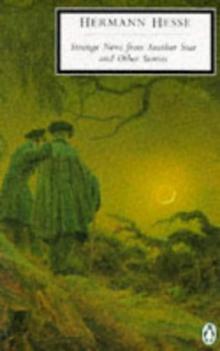 Strange News From Another Star
Strange News From Another Star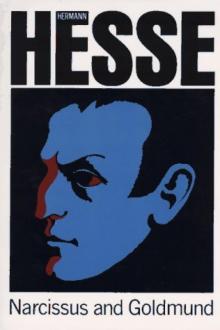 Narcissus and Goldmund
Narcissus and Goldmund Steppenwolf
Steppenwolf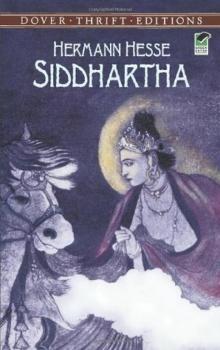 Siddhartha
Siddhartha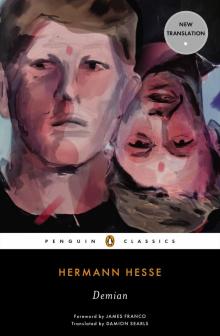 Demian
Demian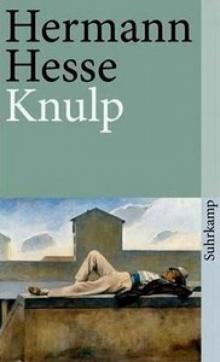 Knulp
Knulp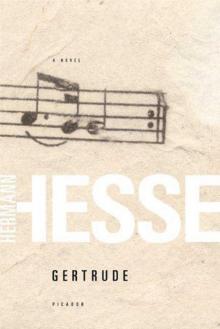 Gertrude
Gertrude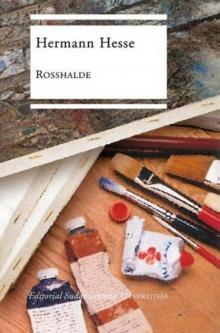 Rosshalde
Rosshalde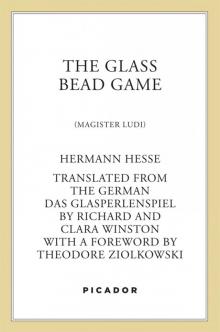 The Glass Bead Game
The Glass Bead Game The Journey to the East
The Journey to the East Klingsor's Last Summer
Klingsor's Last Summer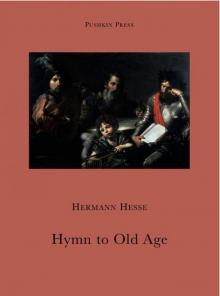 Hymn to Old Age
Hymn to Old Age Poems
Poems The Fairy Tales of Hermann Hesse
The Fairy Tales of Hermann Hesse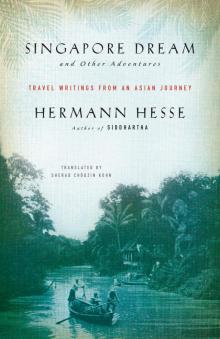 Singapore Dream and Other Adventures
Singapore Dream and Other Adventures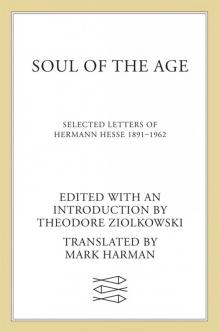 Soul of the Age
Soul of the Age